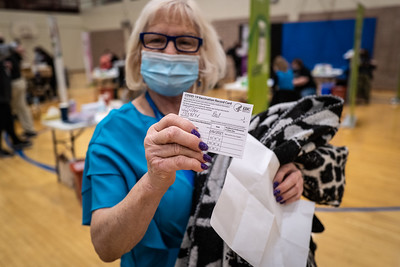If community college trustees around the nation were hoping for a quiet summer, they’re likely to be disappointed. The COVID-19 delta variant cases are exploding in areas with low vaccination rates. Many community colleges are firming up their positions on mandatory COVID-19 vaccines for faculty, staff and students.
The current guidance from the Centers for Disease Control and Prevention suggests that colleges and universities where all students, faculty, and staff are fully vaccinated prior to the start of fall classes can eliminate mask policies and social distancing.
For schools whose population is not fully vaccinated, the CDC suggests that they make alternate plans now. Plans could include re-instituting mask mandates, social distancing policies, routine screenings, random testing or even prohibiting unvaccinated students from returning to campus.
Requiring vaccination may not be as hard as it may seem. A survey of more than 1,000 college students conducted by College Finance in April 2021 showed that nearly 9 of 10 students planned to get the vaccine once it became available to them. More than 7 out of 10 think mandatory COVID-19 vaccines for on-campus students is acceptable.
Major university systems, including SUNY in New York, and the University of California and California State University systems will require students, faculty and staff to vaccinate before coming to campus. Hundreds of other smaller colleges and universities have followed suit.
Delta variant growth is putting additional pressure on schools to announce their COVID-19 plans for the fall. New evidence suggests that the delta variant replicates about 1,200 times faster and carries a much higher viral load than earlier variants of the virus.
Mandatory COVID-19 vaccines may slow COVID spread
Time is of the essence, too. The US is currently registering about 30,000 new cases of COVID-19 each day. The delta variant has caused more than 80% of those cases. While most cases emerged in areas with low-vaccination rates, the variant will gain traction in this area in late summer and early fall. Wisconsin officials are currently monitoring that state’s COVID-19 case load, which has tripled in the past two weeks.
The Pfizer vaccine offers maximum immunity after five weeks. People who receive the vaccine no later than July 26 can have maximum protection against the virus by August 30. The Moderna vaccine offers maximum protection after six weeks. Someone who starts the Moderna series today would not gain maximum immunity until September 3. The Johnson and Johnson vaccine offers maximum immunity after four weeks. Someone who received a Johnson and Johnson vaccine today would have maximum immunity on August 20.
Mandating vaccines is legal
The legality mandatory COVID-19 vaccines is clear. The EEOC and OSHA have both ruled that employers may require vaccines in the interest of creating a safe working environment. Further, colleges and universities can legally require students to vaccinate against a broad range of diseases – not just COVID-19. Some institutions are waiting until the FDA grants full authorization to COVID-19 vaccines. The Biden Administration said earlier this week that authorization could come as early as the end of August. Pfizer and Moderna have already filed requests with the FDA to grant non-conditional authorization for their COVID-19 vaccines. Johnson and Johnson has not yet requested full, non-conditional authorization for its vaccine.
Now is the time to make and announce decisions about how WCC will manage the next wave of COVID-19 on campus. Mandatory COVID-19 vaccines for on-campus students are the best available options to slow the spread of the disease and minimize the symptoms among vaccinated individuals who contract it.
Photo Credit: Phil Roeder , via Flickr




















